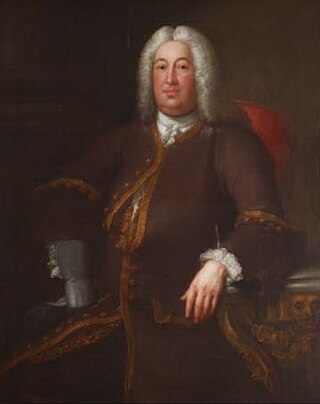Related Research Articles
Sir John Temple was an Irish politician, Speaker of the Irish House of Commons and Attorney General for Ireland. He was the great-great-grandfather of the distinguished statesman Henry John Temple, 3rd Viscount Palmerston. His descendants in the female line include the famous poet Lord Byron.
Sir Maurice Eustace, 1st Baronet was an Irish gentleman, the only holder of the Eustace Baronetcy of Castle Martin in County Kildare, which was created for him in the Baronetage of Ireland on 23 December 1685.
General Sir William Stewart, was a Scottish-born soldier, Commander-in-chief of Queen Anne's Forces in Ireland, Member of Parliament for County Waterford and a Privy Councillor. He was a benefactor of Hanover Square, London, donating the land and laying the first stone of St George's, Hanover Square.
Sir John Hurley, Irish Jacobite, fl. 1714.
Colonel Sir John Hurley, Jacobite soldier and rapparee, fl. December 1694.

Sir Robert Davers, 2nd Baronet was an English Tory politician, landowner and planter.
Ulick Burke, 1st Viscount Galway was an Irish army officer slain at the Battle of Aughrim while fighting for the Jacobites during the Williamite War in Ireland.
Dominick Sarsfield, 4th Viscount Sarsfield was an Irish aristocrat and supporter of the Jacobite cause during the Williamite War in Ireland.
Sir Redmond Everard, 4th Baronet was an Irish Jacobite baronet and politician.
William Dongan, 1st Earl of Limerick was an Irish Jacobite soldier and peer.
Sir Patrick Trant, known as Sir Patrick Trant, 1st Baronet between 1686 and 1691, was an Anglo-Irish politician and Jacobite.
Sir Edward Tyrrell, 1st Baronet was an Anglo-Irish landowner and Jacobite.
Sir John Fitzgerald, 2nd Baronet was an Irish Jacobite politician and soldier.
Walter Dungan, Viscount Dungan was an Irish Jacobite soldier and politician.
Jenico Preston, 7th Viscount Gormanston, was an Irish peer, Jacobite soldier and landowner.
Sir Gregory Byrne, 1st Baronet was an Irish Jacobite soldier and politician.
Sir John Everard, 3rd Baronet was an Irish Jacobite soldier and politician.
Simon Luttrell was an Irish Jacobite politician and soldier.
Nicholas Browne, 2nd Viscount Kenmare was an Irish Jacobite politician and soldier.
Colonel Nicholas Cusack was an Irish Jacobite politician and soldier.
References
- ↑ O'Hart, John, The Irish Parliament of King James the Second in 1689, Irish Pedigrees: or the Origin and Stem of the Irish Nation (5th Ed., 1892), Volume 2. Retrieved 1 February 2023.
- ↑ Alan O'Driscoll and Brian Hodkinson, Hurley, Sir William. 1689, MP for Kilmallock (Lenihan, 743), Who Was Who in Early Modern Limerick. Retrieved 1 February 2023.
- ↑ Officers of the Jacobite Armies, Centre for Robert Burns Studies, University of Glasgow. Retrieved 1 February 2023.